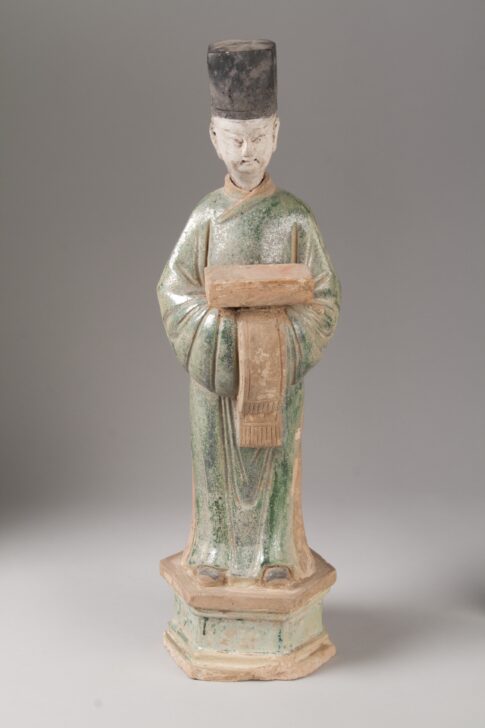Male Attendant
Chinese

Description
Subject Matter:
A sancai (三彩 ), meaning "three-color ware", mingqi (冥器) ("funerary goods") male attendant of the Ming Dynasty (1368-1644).
This type of earthenware figure was mass produced in low-temperature fired kilns to be buried with the deceased as a type mingqi, or “bright object.” Mingqi were made to supply the tomb occupant with everything needed for the afterlife, and they reflect the lifestyle and time in which the deceased lived. During the Ming dynasty, these were manufactured with a three-color glaze palette similar to sancai ware of the Tang dynasty, but could include new colors such as aubergine and turquoise in addition to the green, amber, cream, and cobalt typically associated with sancai.
Since the Qin dynasty (221 - 206 BCE), ceramic figures have been used to replace human sacrifice in burial practices as mingqi as a way to provide for the deceased. Mingqi could include houses, towers, gates, granaries, livestock pens, chicken coops, wells, cooking stoves, storage vessels, dishes, incense burners, and lamps. Figures could include horses, dogs, anthropomorphic animals and people, such as officials, guardians, servants, and entertainers. By the Han dynasty, they also included representations of common people engaged in the activities that consumed their daily lives, such a cooking. The tombs in southern provinces of Sichuan and Shaanxi have revealed a vast array of figures in playful and humorous poses. As grave goods, these mingqi included everything one would need to ensure a comfortable transition into the afterlife. The number of ceramic mingqi items in a tomb could reach numbers of a few to several hundred objects.
Physical Description:
An earthenware sancai three-color glazed figure of a man wearing a long green robe and tall black hat. He is carrying an amber-glazed rectangular box over the top of an amber-glazed tasseled sash that covers his hands, and is standing on a green- and amber-glazed octagonal dais. His face is painted in polychrome mineral pigments, and his head was sculpted separately from the body.
Usage Rights:
If you are interested in using an image for a publication, please visit https://umma.umich.edu/request-image/ for more information and to fill out the online Image Rights and Reproductions Request Form.